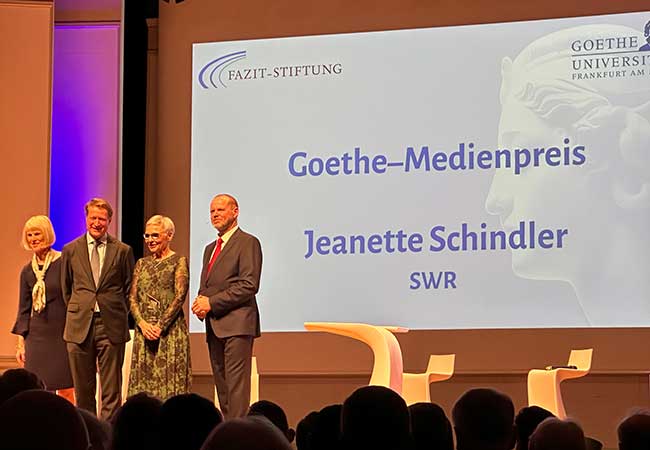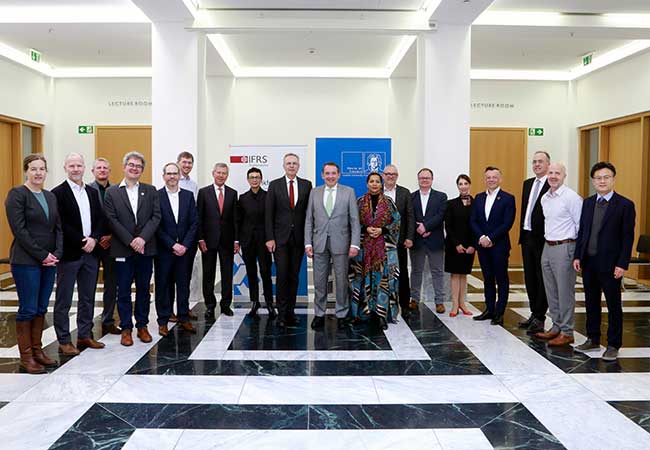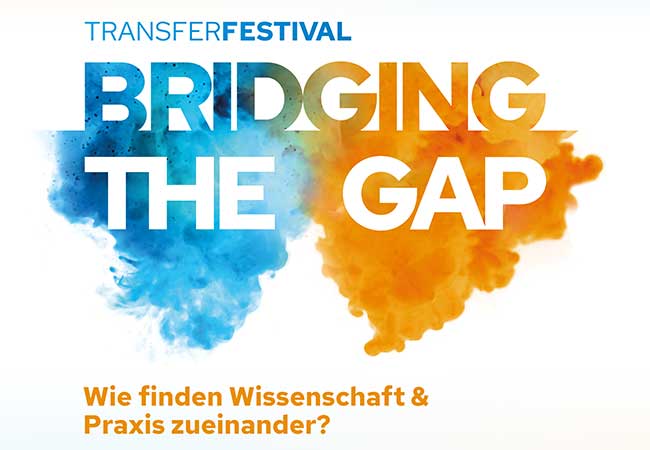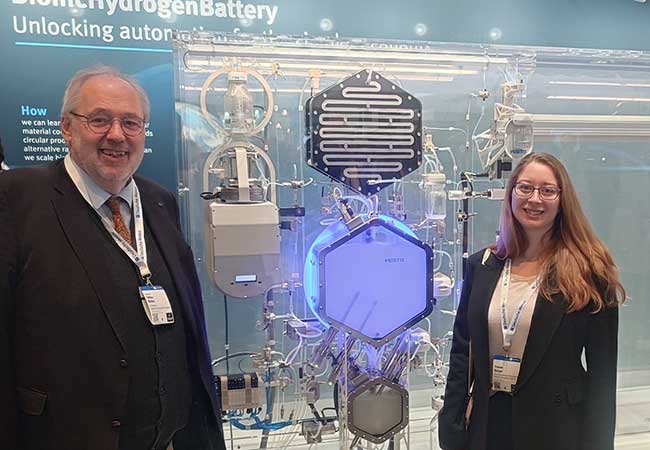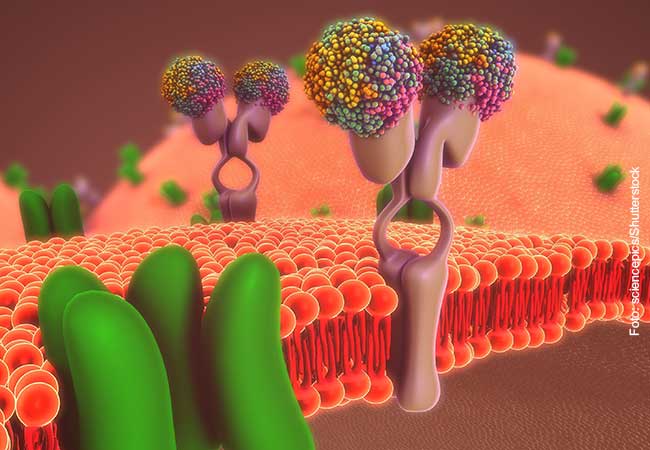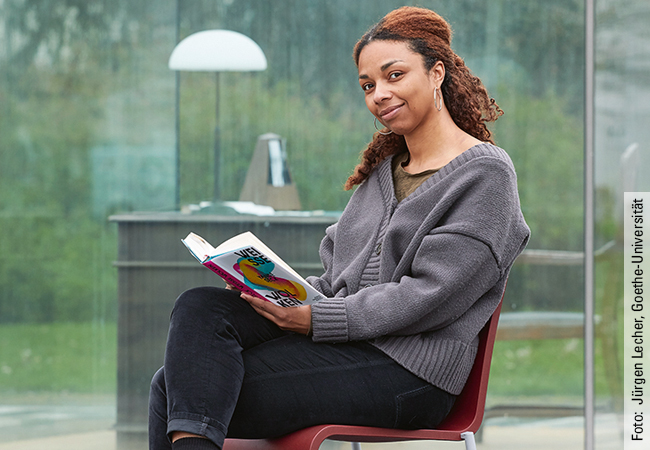Scientific failures as opportunities, the dangers of state influence, and biographies of scientists as role-models. Fascinating topics are the focus of this year’s Goethe Media Prize for science and university policy journalism, awarded to three outstanding teams of authors or individual authors in high-profile media. The prizes honor three works that were either published in print or broadcast on radio in 2021 and 2022.
Jeanette Schindler’s radio feature tackled a topic often treated as a taboo in academia: failure. Scientists always want their research projects to reach a successful conclusion, while failure to achieve an effect is not the goal. But, Schindler’s feature asks, might the “wrong path” harbor some potential findings? Until now, results showing “no effect” have not been published or documented in academia, even though the research data could be useful. Jeanette Schindler’s report also revealed that upcoming researchers in particular are under tremendous pressure to prove themselves. During the Corona pandemic many people, including politicians, expressed annoyance and distrust when scientists had to rectify incorrect assumptions about the Coronavirus. The jury decided to award the first prize, worth €4,000, in recognition of Schindler’s work with its wide variety of interesting voices (“Scheitern in den Wissenschaften”, radio feature broadcast on SWR 2, March 3, 2022).
Does German science promote the Chinese military indirectly? Are German researchers and universities aware of the dangers of transferring expertise, and how do they handle the situation? These questions have been investigated by a team of researchers and writers from the print and broadcasting media Süddeutsche Zeitung, Correctiv, Deutsche Welle and Deutschlandfunk together with other European partners. The group’s findings were published as part of the “China Science Investigation” on May 19 and 20, 2022, and have now scooped the second prize, worth €1,800. The journalists evaluated thousands of scientific papers and examined Chinese websites to identify personal links between numerous Chinese scientists and the Chinese military machine. The research showed that many of the universities where Chinese colleagues work are either closely associated with or fully controlled by the Chinese military. The project gave German science policy some important input for checking relationships with China on a continuous basis.
The third prize, of €1,000, goes to Friederike Haupt (for “Vorbilder”, published in the Frankfurter Allgemeine Sonntagszeitung on December 5,2021). Her work showcased two female physicists who changed the world, although they lived in very different eras and social spheres: Haupt examined parallels in the lives of the two women, and the importance of role-models in providing orientation during turbulent times. She described in a sensitive and comprehensible manner how the politician Angela Merkel has been greatly influenced by the scientist Marie Curie. Merkel was chairwoman of the CDU for 18 years, and Federal Chancellor for 16 years. At the end of her time in office she stressed that politicians don’t have to be role-models, yet in her speeches she made repeated references to Marie Curie, particularly to encourage young girls and women to pursue their chosen paths, especially in science.
Prof. Enrico Schleiff, President of Goethe University, says, “It’s a difficult and invaluable task to present important and relevant scientific or social topics, which often have complex backgrounds and connections, so that the general public can understand and grasp both the question and the answer. The German research system has a lot to offer for the future viability of our society, and communicating science at the highest level is now more important than ever. The Goethe Media Prize once again pays tribute to exceptional quality in science and university policy journalism. The winning publications discussed the way that science works, the value of scientific education for individual self-determination, and its responsibility in international cooperation. These three issues are relevant to the acceptance of scientific findings. We wish to thank our partners – the FAZIT Foundation and the German Association of University Professors and Lecturers – for this long-standing opportunity to honor outstanding achievements in scientific journalism, also as role-models for future projects.”
Speaking for the jury, Carsten Knop, publisher of the Frankfurter Allgemeine Zeitung (FAZ), stressed, “These excellent projects are shining examples of meticulous research and knowledgeable presentation using appropriate language. Investigative, questioning and reflective journalism is not obsolete, but very much alive. And of course this applies not only to written texts, but also to the audio and video formats in the competition. The jury finds that the works of Jeanette Schindler, Lea Weinmann (et al.) and Friederike Haupt demonstrate excellent journalism, and they represent characteristics of journalism that have always been its salient features and will remain so.”
Prof. Bernhard Kempen, President of the German Association of University Professors and Lecturers (DHV), stated, “Journalists not only explain universities and research to the public. Their core tasks include calling things into question and placing them in context, and therefore being critical and asking difficult questions, because they have to approach topics with detachment. I congratulate this year’s prizewinners, who are living up to this aspiration in outstanding ways. Their work stands for quality-conscious scientific and university policy journalism, which the Goethe Media Prize – the first award of its kind nationwide – has been highlighting for 15 years now.”
The independent Goethe Media Prize, launched by Goethe University in 2008 and supported by the FAZIT Foundation, is being awarded in 2022/2023 for the eighth time in recognition of excellent style and content in university and science journalism. The jury and the initiators of the prize hope that it will focus more attention on this type of journalism in the future. The Goethe Media Prize was presented on April 3, 2023, at the DHV’s “Gala der Deutschen Wissenschaft” in Berlin’s Schauspielhaus.


